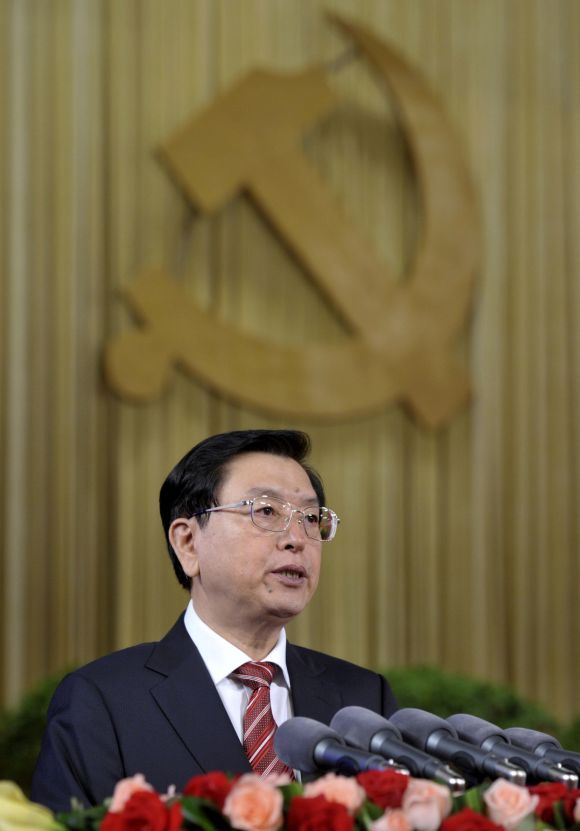 | « Back to article | Print this article |
 Senior Chinese Communist Party leader Zhang Dejiang, who replaced disgraced Bo Xilai as the party chief of Chongqing, was today elected as chairman of the country's Parliament.
Senior Chinese Communist Party leader Zhang Dejiang, who replaced disgraced Bo Xilai as the party chief of Chongqing, was today elected as chairman of the country's Parliament.
Zhang, 67, ranked third in the new leadership of CPC was elected chairman of the National People's Congress, by the 3000-strong legislative body which is holding its annual session in Beijing, an official announcement said in Beijing.
He succeeds Wu Bangguo, 71, the second ranking CPC leader in the outgoing Hu Jintao administration. His election was a foregone conclusion as he has already been chosen by the CPC. Though called the rubber stamp legislature for routinely endorsing CPC policy decisions, NPC is the main legislative body of China which promulgates all laws of the land.
Zhang, son of PLA General ranked third in the powerful seven member standing committee, headed by new leader Xi Jinping which rules the country.
A former vice premier, Zhang shot to fame last year after he was appointed as the head of the CPC committee,Chongqing city, replacing Bo who was removed following a major scandal after the police chief of the city defected to United States consulate in Chengdu, fearing reprisals for probing the role of Bo's wife, in the murder of British national.
Known as reform minded Communist, he worked as head of the CPC units of several provinces including Guangdong, which ranks highest among Chinese provinces in economic development.
Also the NPC on Thursday endorsed the cabinet reshuffle plan at a plenary meeting aimed at reducing the bureaucracy and make the government more efficient in the world' most populous country.
The endorsement of the plan will bring down the number of ministries under the cabinet to 25 from 27, with the break-up of the bulky ministry of railways and merger of several other government departments.
Under the new administrative structure the China's health ministry and the national population and family planning commission, will be merged into a new national health and family planning commission. The status of the existing state food and drug administration will be elevated to a ministerial-level general administration in order to improve food and drug safety.
The National Energy Administration will be restructured to streamline the administrative and regulatory systems of the energy sector.
Two media regulators, the general administration of press and publication and the state administration of radio, film and television, will be merged into a single entity to oversee the country's press, publication, radio, film and television sectors.
The restructuring plan came after complaints about the duplication of functions, overlapping management, low efficiency and bureaucracy often lead to corruption and dereliction of duty among officials without proper supervision over administrative power.